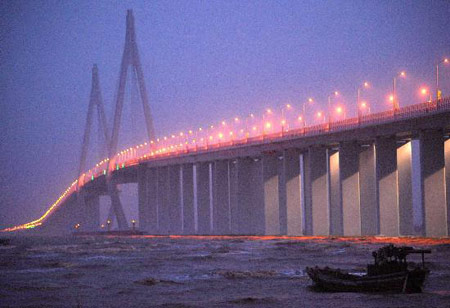
The bridge links Haiyan, Jiaxing City to Cixi, Ningbo City in Zhejiang Province.
It will cut the length of the road trip from Shanghai to Ningbo, a busy port, by 120 km. It is designed to last 100 years.
The bridge, with a 32-km section spanning the sea, is a cable-stayed structure built at a cost of 11.8 billion yuan (1.69 billion U.S. dollars).
Private investors funded almost 30 percent of the project, the first time China's private sector had invested in a major public infrastructure project in the country.
Construction of the six-lane bridge, which will allow a maximum speed of 100 km per hour, started on Nov. 14, 2003 and was completed on June 26, 2007.
A waste water disposal plant with a daily capacity of 270,000 tons has been built near the bridge in Jiaxing to collect and treat waste water from neighboring areas.
"Taking environmental protection into account, the top priority for us is to prevent the Hangzhou Bay water from being polluted," said Qiu Dongyao, Jiaxing executive vice mayor.
As a shortcut between Zhejiang and Shanghai, the bridge is expected to greatly alleviate traffic flow in the booming Shanghai-Hangzhou-Ningbo triangle.
It will also help boost economic integration and development in the Yangtze River Delta, which covers almost 100,000 square kilometers of land comprising Shanghai, Zhejiang and Jiangsu. It is home to 72.4 million people.
"I think it will be easier for our company to recruit high-caliber employees in the future, who always prefer working in small cities like Cixi but living in big cities like Shanghai," said Sun Ningwei, vice president of the Xinhai Electric Co. Ltd. based in Cixi, Ningbo.
"They can leave Shanghai for Cixi in the morning and go back in the afternoon. It's only about 1.5 hours' drive," she said.
Sun Bingdui, a resident from Cixi's Tian'an Village located near the bridge, anticipated a better life after its opening.
"There used to be a desolate beach near our village. Later many factories were built there due to the bridge," he recalled. "I opened a seafood restaurant a few years ago, drawing many of nearby factory workers."
"I was one of the poorest in the village in the past. Now, I'm one of the richest," he said.